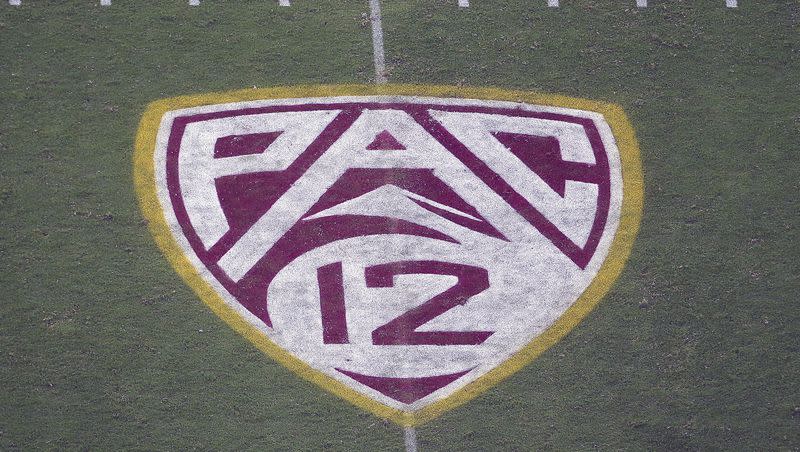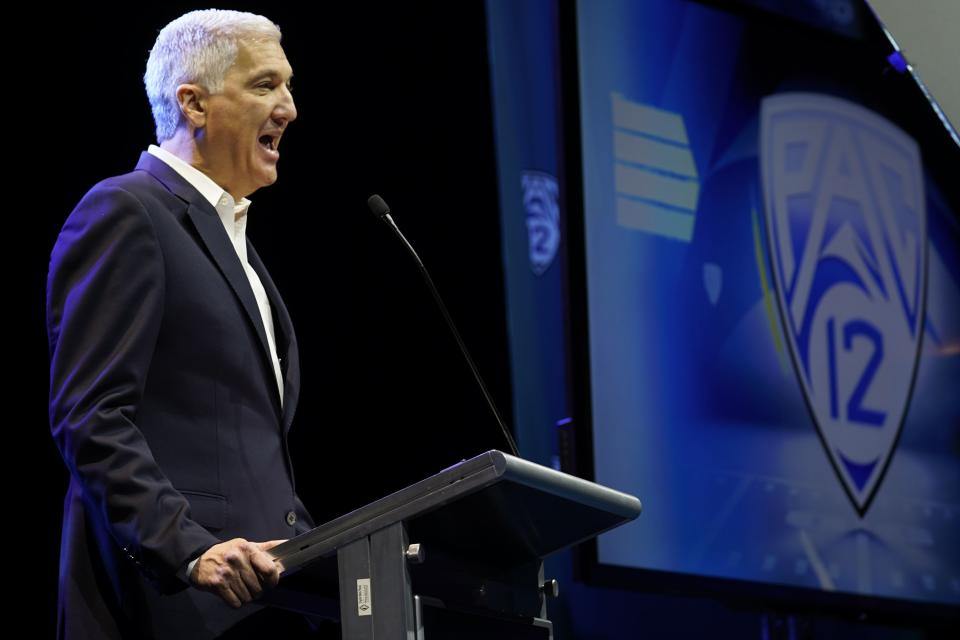Pac-12 TV negotiations reaching critical stage as mood, atmosphere grow more stressful

You’d have to think the Pac-12 TV negotiations are close to producing some breaking news, right?
Not yet.
Then why is there a distinct feeling that the Pac-12 is on the verge of a shakeup?
There are morsels of news filtering down that you can hold up against the backdrop of the league’s statements of solidarity, patience and that a “consummation” of a TV deal is close at hand. You have denials from leaders at Arizona, Arizona State, Colorado and Utah that they are not going to bail on their Pac-12 membership. Yet there are Pac-12 teams talking with the Big 12.
Two developments took place in the past week, one of them a stark disagreement in reporting by Dennis Dodd of CBSsports.com and Nicole Auerbach of The Athletic and Sports Illustrated’s Ross Dellenger. The other news was a statement by Washington State president Kirk Schulz that the reason a media deal hasn’t been announced is that a TV partner needs six weeks of separation from major corporate layoffs — the optics would be bad.
First, the debate between Dodd and Auerbach and Dellenger.
It appears @espn is out as a @pac12 primary rightsholder. While that was an industry assumption for a while, it takes the No. 1 sports rights leader off the table at a critical time. https://t.co/DpgU0ggou9
— Dennis Dodd (@dennisdoddcbs) May 4, 2023
Dodd reported that word from the spring Fiesta Summit in Phoenix more than a week ago was that Big 12 officials were told by ESPN executives “its league was one of three conferences the network would be airing in the future.” ESPN currently has Power Five deals with the SEC, ACC and Big 12 (a new pact which begins in 2025).
Dodd reported ESPN is currently not doing anything with the Pac-12, whose TV rights expire in July 1, 2024.
Auerbach quickly tweeted: “ESPN remains a bidder for the Pac-12’s tier one rights, a source tells @TheAthletic.”
Dellenger then took to Twitter with, “A note from conference meetings in Scottsdale: ESPN remains in negotiations with the Pac-12 for its primary TV package, multiple sources tell @SInow. In fact, the league and network held discussion as recently as today.”
Days later, Dodd joined the 365 Sports radio show in Waco, Texas, and doubled down on what he reported. “I stand by my reporting,” said Dodd. “Everything is qualified.” However, he then said everything could change in a week.
In my opinion, both sides of this disagreement could be correct. ESPN may have an offer on the table and is done. On the other side, ESPN and the Pac-12 folks could in truth say both sides are talking.
Dodd said he did have a Pac-12 school official apologize to him for the backlash he received on Twitter for his reporting.
Related
Fox Sports college analyst Brock Huard, who attended the Fiesta Summit, told KSL 1280theZone in Salt Lake City on the “Hans and Scotty Show” that he felt a contrasting vibe from Big 12 and Pac-12 gatherings in Scottsdale. The Big 12 had momentum and energy, but he sensed frustration from Pac-12 folks who are understandably stressed as TV negotiations drag on. You can listen to Huard here.
Here is a partial report from that interview found on KSL Sports.com:
“What they need to hear is the direction. What they need to hear is that we’re close to a deal,” said Huard. “And now, obviously, (George Kliavkoff) can’t do that publicly and you don’t negotiate through the public and all of that. My gut and my hunch is that there is a deal there. But it’s not at the numbers anywhere near the number they want.
“It’s likely a deal that’s going to be spliced among a bunch of the networks. I thought the company that I worked with at Fox was out. I got a sense over this week that they’re not because right now, I think a lot of these networks are feeling some blood in the water that there may be a number now that, at first, the Pac-12 scoffed at. But now may have to live with and it may be a number that doesn’t compete with the Big 12 but is a number that at least keeps this group together.”
It was Pac-12 reputed reporter Jon Wilner at the San Jose Mercury News who reported through a university-generated release that a TV announcement delay may be due to optics.
Washington State president cites media and tech layoffs for delay in announcing Pac-12 TV deal https://t.co/zS6iL7Opay pic.twitter.com/xOEd7PmrGv
— Awful Announcing (@awfulannouncing) May 6, 2023
The quote by WSU’s Schulz:
“I think it’s just the environment. It’s the uncertainty in the economy, the layoffs in the tech sector and other places.
“I know at least one of the partners we were talking to said, ‘We’re ready to sign today, but the optics of us announcing that we’re laying off X number of people and we signed a multimillion-dollar deal with the Pac-12 are just not the best, so we’re going to have to wait six weeks.’
“Clearly, the optics are something those folks are really worried about.”
Right now, optics are basically what the Pac-12 has going for it. The optics are solidarity in the face of a lot of frustration.
The comments by Schulz drew pessimistic criticism from Sports Business Journal’s Andrew Marchand and Action Network’s Brett McMurphy this week.
McMurphy said because of many misleading statements by Pac-12 presidents, (impeding deal and value of package expected) it is hard to take seriously what they say, and that they may be misled. McMurphy said the Big Ten doesn’t want to be the bad guy in a Pac-12 collapse and is waiting for the Big 12 to be the cause through poaching dissatisfied members. He said the Big Ten would then snatch Oregon and Washington.
McMurphy said the Dodd report was accurate, ESPN is out as a tier one partner, but is keeping options open. He said Auerbach and Dellenger were also correct because ESPN, like the Big Ten, doesn’t want to play the bad guy if the Pac-12 collapses. Simply put, without USC and UCLA and the current market, the Pac-12 is undervalued and windows to air college football on linear channels are filling up.
Related
Many college insiders, including Dodd, have reported since last summer that some Pac-12 teams have hedged their bets, as any responsible administrator would do, and have had talks with Big 12 commissioner Brett Yormark. Those talks have continued on as late as just weeks ago and have not abated despite league leaders holding to loyalty promises.
But loyalty only goes as far as the money piles up. Just ask USC, UCLA, Texas and Oklahoma.
Then there are a lot of loud voices chiming in on the issue almost daily.
These include “The Monty Show,” a Salt Lake City-based podcast on YouTube, which reported on Twitter: “Sources also tell me ESPN would like to do a deal with the Pac-12 but have been firm in their financial offer, which I am told is $90 million per season, and has told the Pac-12 they will not go beyond that number, as ESPN is looking for a game or two outside of prime windows.”
Expect a move from #Buffs and #BearDown just after Memorial Day. As we reported months ago, the only actusl offer from @ESPN at $9M per team and they may get another $10M from @AppleTV, but no guarantees. So $19M per team and a very large portion of that is streaming only. pic.twitter.com/2gMhLPCv7E
— SWAIM SHOW (@GSwaim) May 10, 2023
Another is Greg Swaim, a radio personality who has 67,000-plus followers on Twitter. He posted the following on Wednesday: “Expect a move from #Buffs and #BearDown just after Memorial Day. As we reported months ago, the only actual offer from @ESPN at $9M per team and they may get another $10M from @AppleTV, but no guarantees. So $19M per team and a very large portion of that is streaming only.”
That’s pretty bold, naming Arizona and Colorado from the so-called Four Corner schools bolting from the Pac-12. And even naming a done-by date.
If the Pac-12 remains intact as 10 or 12 it is likely for less than the Big 12’s renegotiated TV deal of $31 million per team, likely in the low to mid-20s, and it most likely will be a majority of streaming product produced by different studios. It will take a hit on linear availability.
Is this enough? Could be short term. Or it might be the trigger that topples it all.
Stay tuned.


